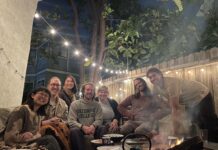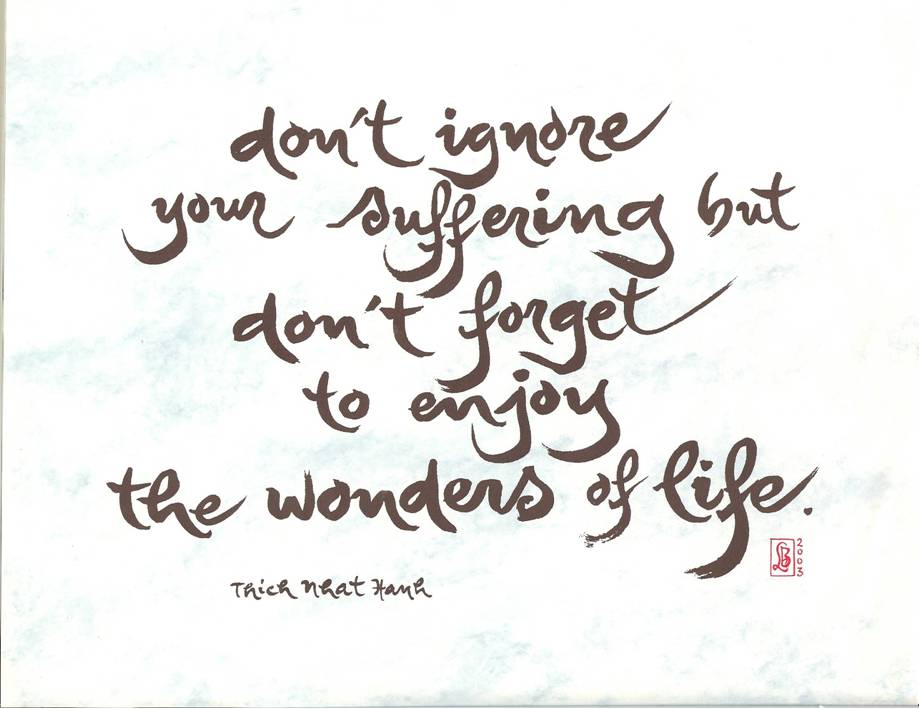By Jonathan Borella
Aware of the suffering caused by exploitation, social injustice, stealing, and oppression, I am committed to practicing generosity in my thinking, speaking, and acting. I am determined not to steal and not to possess anything that should belong to others; and I will share my time, energy, and material resources with those who are in need. I will practice looking deeply to see that the happiness and suffering of others are not separate from my own happiness and suffering; that true happiness is not possible without understanding and compassion; and that running after wealth, fame, power and sensual pleasures can bring much suffering and despair. I am aware that happiness depends on my mental attitude and not on external conditions, and that I can live happily in the present moment simply by remembering that I already have more than enough conditions to be happy. I am committed to practicing Right Livelihood so that I can help reduce the suffering of living beings on Earth and reverse the process of global warming.
The Second Mindfulness Training teaches us that true happiness is found not in taking but in giving. We are lucky we don’t have to spend our whole lives learning this truth. It is laid out so clearly for us on the path of mindfulness. Still, as I look back over the past few years, I can very clearly remember times when I did not practice this training well. So today, I’m asking myself, “What are my obstacles to being generous, to finding complete joy in giving freely?”
What speaks to me the most about this training is ow it exhorts us to stop chasing not only material goods, like wealth, but subtler comforts as well, which for me include reputation and even love. Instead we are taught to dwell in this moment and to take nourishment in the conditions for happiness that are available now. This is important because one of the obstacles to practicing this training is thinking we don’t have enough to give. It may very well be that our financial and material resources are limited but these circumstances are not actually obstacles to practice. In my experience, they can help deepen my practice.
A smile or a kind word can be just as precious a gift as anything material and cost me nothing to give. Nonetheless, I am aware of times in my life when I’ve been stingy even with those. Reflecting on those moments, I can see that it was my own frustration with life that prevented me from practicing this training, and it is those moments in my life that I regret the most. Every opportunity to practice generosity we let slop by is an opportunity to connect with another person and make a difference in his or her life.
A smile or a kind word can be just as precious a gift as anything material and cost me nothing to give.
Here again, the importance of dwelling happily in the present moment reveals itself. If we know how to find joy in the sunshine, the rain, simple food, the presence of loved ones and so many other miracles, we no longer allow our frustrations to rule us. We can smile with joy and with pain and we can share our smile with other people who are also suffering.
I see a strong connection between the second mindfulness training and the practice we call flower watering. This is the practice of only saying and doing things that help people realize their full potential. It seems so simple but actually requires a lot of wisdom and for a long time I misunderstood this practice. I though to practice flower watering I had to find ways of shaping peoples behavior by condoning what I saw as positive and condemning what I saw as negative. When I perceived negative behavior I found it very hard to practice generosity and I created a lot of tension and suffering between myself and someone I loved.
Practicing true generosity means giving freely to people what they actually need to be happy.
Now, I am learning a better way to practice. By learning to dwell happily in the present moment regardless of what I perceive as positive and negative I can remain at peace and I can share this peace with others, watering their seeds of joy and freedom. If we learn to practice like this, then we are giving what is a rare gift in our society – the gift of acceptance, equanimity. Not only do we rarely receive this gift from others, we rarely receive it from ourselves. But it is the gift we ae most hungry for. If we can give the gift of acceptance we will notice its effects right away. We will be more at peace, and our loved ones will know that they are loved.
Practicing true generosity means giving freely to people what they actually need to be happy. People need love, space, acceptance, and non-judgment. By learning how to dwell happily in the present moment, we cultivate these qualities in ourselves and we are able to share them with whoever we find in front of us.

















